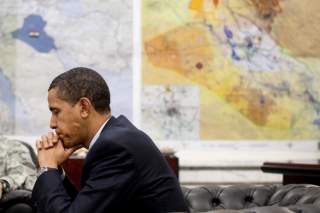A New Normal?
"Whether he intended it or not, President Obama implied in his address on ISIS that the country should brace for a new normal of small-scale, periodic terrorist attacks."
Whether he intended it or not, President Obama implied in his address on ISIS that the country should brace for a new normal of small-scale, periodic terrorist attacks. He acknowledged the reality that Islamic extremism and terror has spread and that the most recent attacks in San Bernardino are part of a broader string of attacks that the United States and its allies have faced since 9/11. But he did not offer a different strategy that could accelerate the defeat of ISIS and substantially reduce the Islamist threat generally—external or homegrown.
The President’s strategy, which he affirmed in his remarks, has three elements:
1) A counterterrorism strategy that emphasizes tactical measures such as air strikes and Special Forces raids, but avoids significant U.S. commitments on the ground.
2) A redoubled commitment to U.S. principles of tolerance and open immigration.
3) Hardened homeland security efforts that include a more restrictive gun control regime.
The status quo, however, is inadequate for the hybrid challenge that has evolved since 9/11. Today’s Islamist threat is becoming more decentralized, savvy in the use of social media and capable of inspiring homegrown terrorists. ISIS controls enough territory to deploy operatives and project an ideological message—power that is amplified by self-starters acting without central guidance.
Surprisingly, the president’s address was also inattentive to the politics of counterterrorism in this country. He wants to avoid an overreaction, which could result in extended U.S. deployments and “a war between America and Islam,” as he put it in his remarks. But complacency too, or even the appearance thereof, could lead to precisely what the president wants to prevent.
Even before San Bernardino, the American people were losing confidence in the president’s strategy to combat terrorists. According to a recent CNN poll, over two-thirds of Americans believe the U.S. response to ISIS has not been aggressive enough. Six in ten disapprove of President Obama’s handling of the threat. Public opinion is hardening against taking in Syrian refugees.
Without a more effective strategy to deal with the threat, the public may come to support counter-productive approaches. This is happening already in France, where President Hollande’s seemingly inadequate response to the Paris attacks has produced gains for more extreme political parties.
The evolution of the terrorist threat, exemplified by the Paris and San Bernardino attacks, calls for a new strategy.
Washington and its allies should take decisive steps to end the civil war in Syria, destroy ISIS and embrace a comprehensive long-term effort to normalize the Middle East. So long as there is chaos in the region that creates opportunities for groups like Al Qaeda and ISIS, radical Islam will serve as a rallying call for disgruntled youth both in the region and in the West.
In the short-term, a comprehensive strategy will involve a U.S.-led no-fly zone to protect civilians, ground forces to defeat ISIS—which a majority of Americans now support—and heavier arms transfers to the Kurds. Longer-term, the United States will need to take the lead in transforming the Middle East politically and geopolitically, just as we did in Europe and East Asia after World War II. While military operations might generate tactical successes, the defeat of ISIS and other similar groups will require sustained partnerships with local allies to mobilize the people of the region against radical Islamism. It will also require convening regional forums and dialogues to tamp down sectarianism and encourage a positive vision of tolerance for the greater Middle East.
Confronting the homegrown challenge is more complicated. The president’s emphasis on gun control is simplistic and only politicizes a multi-faceted issue that requires bipartisan consensus. Reasonable compromises on issues like visa and immigration reform and government surveillance will be difficult to broker if Republicans lack confidence in the president’s seriousness. One step that will be necessary, for example, is greater cooperation between tech companies and the government in monitoring communications among extremists, an issue fraught with sensitive constitutional questions because it will affect the ability of all citizens to encrypt their communications.
The fundamental questions that need to be confronted are simple but difficult to address. Why is a small but significant segment of Muslim youth in the West—despite having all the trappings of success in society—drawn to the fanaticism of ISIS and other extremist groups? What can American society do about it in a way that is consistent with our interests and values?
One needed initiative is to partner with those in immigrant communities who understand that their home countries need to embrace modernity and tolerance. Immigrants who believe in liberal democracy and universal human rights could be the vanguard in thinking through needed reforms in the Muslim world and in engaging foreign publics.
We’ve been through this before. In the years before and after World War II, communist parties and their fellow travelers made extensive gains in Europe and, to a lesser degree, in the United States. This produced a backlash in the form of McCarthyism and other right-wing excesses. But over time, American society found a way to accommodate dissent and secure a bipartisan consensus that defeated not just the Soviet Union but also communist ideology. Replicating this achievement in the context of radical Islamism is the challenge for President Obama and his successor.
Zalmay Khalilzad, a former director of policy planning in the Department of Defense, was the U.S. ambassador to Afghanistan, Iraq and the United Nations.
Image: Flickr/White House

